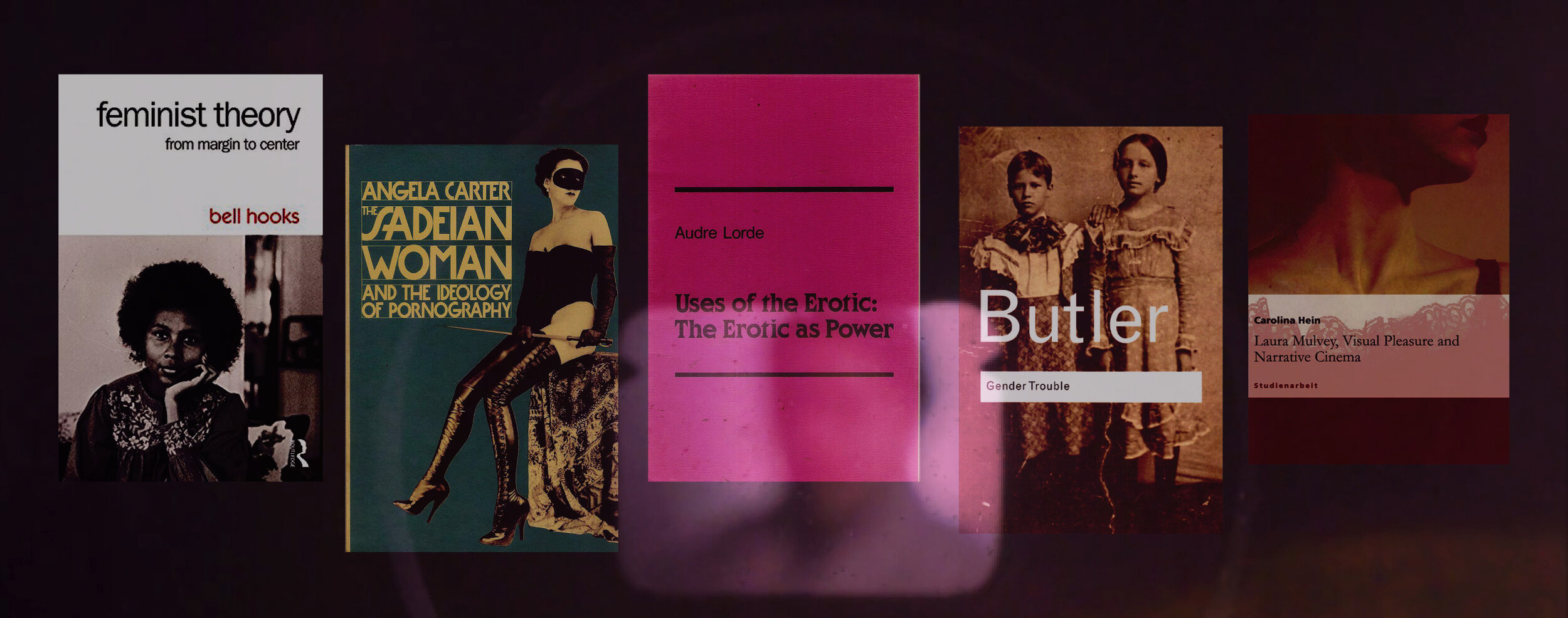
BRAINWASHED is indebted to the illuminations of many important theorists, whose writing has informed our movie. Most especially, we are grateful to the insights of Laura Mulvey, Teresa de Lauretis, bell hooks, Judith Butler, Angela Carter and Mary Ann Doane.

A selection of our favourite essential texts:
Visual Pleasure and Narrative Cinema by Laura Mulvey
Feminist film theorist Laura Mulvey’s seminal essay from 1975, where she explains the “Male Gaze” and “To Be Looked-At-Ness”.
Download the full essay HERE.
Gender Trouble by Judith Butler
Judith Butler, currently Maxine Elliot Professor in Rhetoric and Comparative Literature at the University of California Berkeley, is one of the most widely read feminist and continental philosophers working in America today. In Gender Trouble, she cracks open questions and assumptions about gender on multiple levels.
'Rereading this book, as well as reading it for the first time, reshapes the categories through which we experience and perform our lives and bodies. To be troubled in this way is an intellectual pleasure and a political necessity.' - Donna Haraway
Routledge Classics, 2006
Download an excerpt HERE
Uses of the Erotic by Audre Lorde
African American poet Audre Lorde explains how women can reclaim the power of the erotic in her essay Uses of the Erotic from “Sister Outside”, 1984.
Download the essay HERE.
The Visual Language of Oppression by Nina Menkes
Menkes’s viral article about how the Male Gaze connects to sexual abuse/sexual assault and employment discrimination against women.
Filmmaker Magazine 2019
READ the essay HERE
The Oppositional Gaze by bell hooks
In the critical essays collected in Black Looks: Race and Representation bell hooks interrogates old narratives and argues for alternative ways to look at blackness, black subjectivity, and whiteness. Her focus is on spectatorship―in particular, the way blackness and black people are experienced in literature, music, television, and especially film―and her aim is to create a radical intervention into the way we talk about race and representation. As she describes: "the essays in Black Looks are meant to challenge and unsettle, to disrupt and subvert."
hooks specifically theorizes the black female spectator. She criticizes both the male gaze through Michel Foucault’s concept of the relations of power, and the blindness of white feminism which has dominated feminist film theory. Bell hooks’ vision of the Oppositional Gaze is an essential tool for liberation, for all of us.
Download the full essay HERE
Purchase the book HERE.
Feminist Theory: From Margin to Center by bell hooks
A cultural critic, an intellectual, and a feminist writer, bell hooks is best known for classic books including Ain’t I a Woman, Bone Black, All About Love, Rock My Soul, Belonging, We Real Cool, Where We Stand, Teaching to Transgress, Teaching Community, Outlaw Culture, and Reel to Real. hooks is Distinguished Professor in Residence in Appalachian Studies at Berea College, and resides in her home state of Kentucky.
‘I will not have my life narrowed down. I will not bow down to somebody else's whim or to someone else's ignorance.’ - bell hooks
Routledge, 2015
The Sadeian Woman and the Ideology of Pornography by Angela Carter
Angela Carter (1940 -1992) wrote nine novels and numerous short stories, as well as nonfiction, radio plays, and the screenplay for Neil Jordan's 1984 movie The Company of Wolves, based on her story. She won numerous literary awards, traveled and taught widely in the United States, and lived in London.
Penguin, 2001 (third edition)
Technologies of Gender by Teresa de Lauretis
Technologies of Gender (1987) builds a bridge between the fashionable orthodoxies of academic theory (Lacan, Foucault, Derrida, et al.) and the frequently-marginalized contributions of feminist theory. In sum, de Lauretis has written a book that should be required reading for every feminist in need of theoretical ammunition―and for every theorist in need of feminist enlightenment.
Indiana University Press, 1987
Beyond God the Father by Mary Daly
Mary Daly explores the deep bias against women embedded in traditional religions and argues for a liberating spirituality that is non-patriarchal and empowering for women. Mary Daly famously suggested that “all you have to do to become a witch is say three times to yourself, “I am a Witch, I am a Witch, I am a Witch”.
Nina Menkes used this sentence as dialog in her first feature, made at the UCLA film school: “MAGDALENA VIRAGA (1986), winner of a Los Angeles Film Critics Award.
Buy the book HERE.

